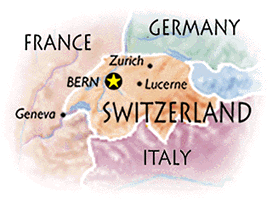
 Switzerland
Switzerland

Brief History
The name "Switzerland" is derived from Schwyz, one of the three small states that founded the Confederation.
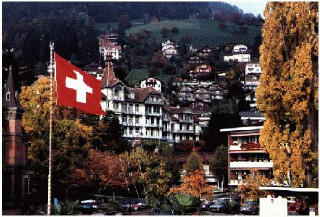
The foundation of the Swiss State was laid in 1291, when the people of Uri, Schwyz and Unterwalden, on the shores of Lake Lucerne, united in a defensive league against the mighty House of Habsburg. Other cities and districts anxious to maintain their independence joined the league.
In 1815 the Republic of Geneva was one of the last cantons to agree to join. In 1979 the new Canton Jura was formed, which was formerly part of Berne.
Today, there are 23 cantons, three of which are divided into half-cantons.
Switzerland's capital is Bern.
The national languages of Switzerland are German (North, Central and Eastern Switzerland), French (Western Switzerland), Italian (Southern Switzerland) and Romansh - a derive of Latin - (South-Eastern Switzerland).
English is widely spoken.
The CH that appears on Swiss cars is the abbreviation of the latin form: Confoederatio Helvetica.
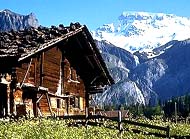
Switzerland is situated at the heart of Europe. It is surrounded by Germany to the north, Austria and the Principality of Liechtenstein to the east, France to the west and Italy to the south.
The geological structure of Switzerland is complex. It forms part of the Alpine arc which stretches almost 1000 kilometres from Nice (French Maritime Alps) to Vienna (Austrian Alps).
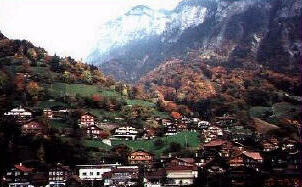
Switzerland embraces the centre part of the Alps, with its four main passes - Grimsel, Furka, St. Gotthard and Oberalp; here also spring the sources of the rivers Rhone and Rhine.
Switzerland offers, on a small territory of 15,944 sq. miles, a huge quantity of beautiful landscapes which cannot be seen anywhere else on such a limited surface.
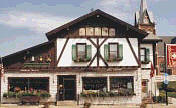
Due to its central position, Switzerland has been, throughout history, an important link in communications and transport between northern and southern Europe.
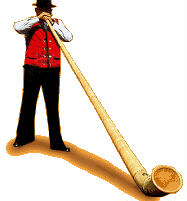
The climatic conditions of Switzerland vary considerably and no country in Europe combines within so small an area such marked climatic contrasts. In the northern plateau surrounded by mountains the climate is mild and refreshing. South of the Alps the climate is warmer coming as it does under the influence of the Mediterranean weather. The Valais area is noted for dryness.
Switzerland is affected by Atlantic currents bringing moist air and Mediterranean currents bringing warm air.
Under normal circumstances, summer in all parts of Switzerland should be sunny and warm but unfortunately we have no means of giving long term forecasts.
During spring, summer and autumn it is advisable to take good clothes, including a warm jacket and good walking shoes, as excursions are often to mountains which are snow-covered during summer. A warm jacket, good trousers and shoes are necessary in the winter months.
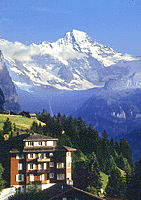 Switzerland was founded more than 700 years ago. Long years of peace have left their happy mark on our heritage, history and culture. And the quality of peace in Switzerland is special.
Switzerland was founded more than 700 years ago. Long years of peace have left their happy mark on our heritage, history and culture. And the quality of peace in Switzerland is special.
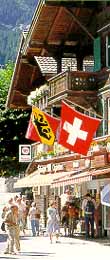 The Swiss are a friendly and hospitable people, though somewhat reserved at times. Cleanliness and orderliness are the order of the day. Life in our towns and cities is secure. We share an independent spirit, a respect for tradition, no fewer than four languages and dozens of dialects. All this finds expression in the country's
fascinating folklore, deeply rooted in the nation's past. Colourful markets reflect our rural lifestyles. The seasons are marked by traditional festivals and popular pageants. Some may celebrate the end of winter, others a successful wine harvest.
The Swiss are a friendly and hospitable people, though somewhat reserved at times. Cleanliness and orderliness are the order of the day. Life in our towns and cities is secure. We share an independent spirit, a respect for tradition, no fewer than four languages and dozens of dialects. All this finds expression in the country's
fascinating folklore, deeply rooted in the nation's past. Colourful markets reflect our rural lifestyles. The seasons are marked by traditional festivals and popular pageants. Some may celebrate the end of winter, others a successful wine harvest.
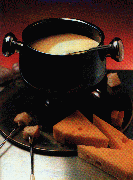 Hotels and restaurants throughout the country take pride in serving traditional local cuisine. Each region has its specialities - Fondue and Raclette (melted cheese dishes) in the French part; sausages, roasts and R�sti (fried potatoes) in the German part; sliced air-dried meat (B�ndnerfleisch) in the Graub�nden region; and Italian specialities in Ticino. And Swiss wines are one of the country's best-kept secrets.
Hotels and restaurants throughout the country take pride in serving traditional local cuisine. Each region has its specialities - Fondue and Raclette (melted cheese dishes) in the French part; sausages, roasts and R�sti (fried potatoes) in the German part; sliced air-dried meat (B�ndnerfleisch) in the Graub�nden region; and Italian specialities in Ticino. And Swiss wines are one of the country's best-kept secrets.
 Swiss goods are world renowned for high quality and superb finish. The best place to buy genuine Swiss souvenirs is in one of the Heimatwerk (shops which offer a marvelous choice of handmade products from all parts of the country). Look for linens, embroideries, fine handkerchiefs, textiles, woodcarvings, ceramic arts, toys, dolls, multi-blade pocket knives and music boxes. Some of the best woodcarvings come from the famous center in Brienz.
Swiss goods are world renowned for high quality and superb finish. The best place to buy genuine Swiss souvenirs is in one of the Heimatwerk (shops which offer a marvelous choice of handmade products from all parts of the country). Look for linens, embroideries, fine handkerchiefs, textiles, woodcarvings, ceramic arts, toys, dolls, multi-blade pocket knives and music boxes. Some of the best woodcarvings come from the famous center in Brienz.

 You will also find a dazzling variety of Switzerland's best-known products- watches and clocks. Other good buys include chocolates- available in all shapes and sizes, woolen sportswear, ski apparel and equipment, and precision instruments.
You will also find a dazzling variety of Switzerland's best-known products- watches and clocks. Other good buys include chocolates- available in all shapes and sizes, woolen sportswear, ski apparel and equipment, and precision instruments.
 In the quaint old sections of Bern, Geneva and Lausanne, there are quite a few shops which specialize in old books and antiques.
In the quaint old sections of Bern, Geneva and Lausanne, there are quite a few shops which specialize in old books and antiques.
Shopping in our cities is one of life's great delights. The list of excellent buys is long and varied. The finest watches, elegant jewellery, delicious chocolates, exclusive embroideries, fascinating music boxes and multi-blade pocket knives. Swiss shops offer 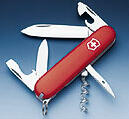 the most prestigious products that money can buy.
the most prestigious products that money can buy.
The VICTORINOX "Swiss Army Knife" is 100 Years Old.Over 34,000 of these pocket tools with the distinctive  Swiss cross leave the factory in central Switzerland each day. Ninety per cent are for export to over 100 different countries and serve as ambassadors for Switzerland.
Swiss cross leave the factory in central Switzerland each day. Ninety per cent are for export to over 100 different countries and serve as ambassadors for Switzerland.
In Switzerland, the cow bells ring at the crack of dawn. That�s what wakes the rooster.
There is nothing more Swiss than waking on a fresh Alpine morning to the sound of cow bells in the pasture. Swiss farmers have been using bells on their cattle for centuries, primarily to locate the herd in the open Alpine meadows. Bells have become part of Swiss tradition.
 Return to the Fridge door
Return to the Fridge door